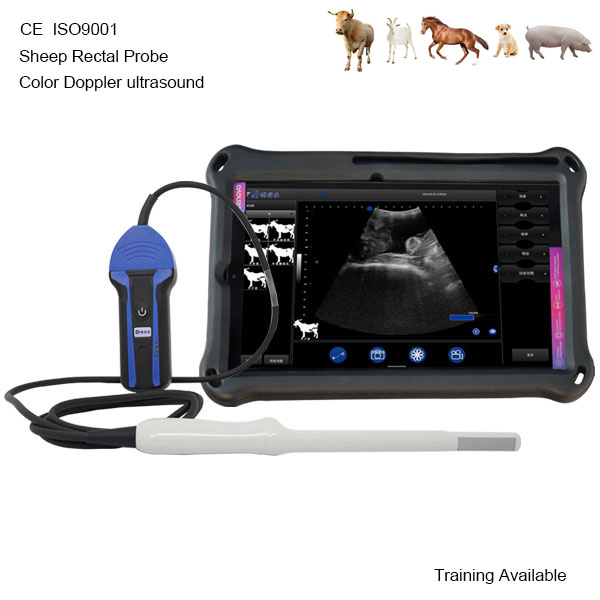Sheep Pregnancy Ultrasound: Smart Technology for Accurate Reproductive Management
In today’s modern livestock industry, sheep pregnancy ultrasound has become an indispensable tool for farmers and veterinarians aiming to improve reproductive efficiency and flock productivity. With advanced veterinary ultrasound machines, it is now possible to detect pregnancy in ewes accurately, monitor fetal development, and optimize herd management in a safe and non-invasive way.

What Is Sheep Pregnancy Ultrasound?
Sheep pregnancy ultrasound is a diagnostic imaging process that uses high-frequency sound waves to visualize a ewe’s uterus and confirm whether she is pregnant. Unlike manual palpation or hormonal testing, ultrasound provides real-time, visual confirmation of pregnancy status — allowing farmers to make quick and reliable decisions about breeding and feeding management.
The scanning process is simple: a portable veterinary ultrasound machine equipped with a convex or linear probe is placed on the ewe’s abdomen or rectal area to capture internal images. Within seconds, the operator can identify a gestational sac, fetus, or multiple embryos — all without harming the animal.
Why Early Pregnancy Detection Matters
Early and accurate pregnancy detection is crucial in sheep production. It helps farmers:
Identify Non-Pregnant Ewes (Empty Ewes):
Non-pregnant sheep can be separated early and re-bred in the next cycle, saving valuable time and feed costs.
Plan Nutrition and Management:
Pregnant ewes require balanced diets and different care routines. Knowing pregnancy status early ensures better lamb health and higher survival rates.
Estimate Lambing Time and Litter Size:
Ultrasound helps estimate the number of lambs and expected delivery dates, improving lambing preparation.
Enhance Flock Productivity:
By reducing non-productive days and optimizing breeding intervals, ultrasound contributes to better overall reproductive performance.
When to Perform a Sheep Pregnancy Ultrasound
The best time for ultrasound pregnancy scanning in sheep is usually 25 À 35 days after mating. At this stage, the embryo and fetal fluids can be clearly detected with a suitable ultrasound probe.
For larger farms or research facilities, follow-up scans may be conducted later (around 60–80 days) to confirm fetal viability and count the number of lambs.
Equipment Used for Sheep Pregnancy Ultrasound
Choosing the right veterinary ultrasound machine is key to achieving clear and accurate results. For sheep breeding, the following types are commonly used:
Portable Ultrasound Machines: Lightweight and battery-powered; ideal for use in the field.
Wireless Handheld Scanners: Connect via Wi-Fi to smartphones or tablets, making real-time imaging and sharing convenient.
Waterproof Models: Designed for outdoor and farm environments with durable, easy-to-clean housing.
High-Resolution Display Systems: Provide detailed imaging for embryo observation and fetal development tracking.
The most effective probe types for sheep pregnancy scanning are convex (for abdominal scans) and rectal linear (for reproductive monitoring).
Advantages of Using Ultrasound for Sheep Pregnancy
High Accuracy: Provides immediate visual results with near 100% accuracy after 30 days of gestation.
Non-Invasive: Safe for repeated use without causing stress or harm to animals.
Time and Cost Efficiency: Helps farmers reduce wasted feed and labor costs on non-pregnant animals.
Improved Animal Welfare: Early detection allows better health management and reduced pregnancy complications.
Increased Productivity: Enables precise control over breeding programs and lambing schedules.
How to Conduct a Sheep Pregnancy Ultrasound
Prepare the Animal: Keep the ewe calm and positioned securely. For abdominal scanning, ensure the scanning area has minimal wool or apply ultrasound gel.
Choose the Right Probe: A 3.5–5.0 MHz convex probe works well for abdominal imaging.
Begin Scanning: Gently move the probe over the abdomen or rectal area to locate the uterus and detect pregnancy signals.
Interpret the Image: Look for a fluid-filled uterine sac or visible embryo; multiple sacs indicate twin or triplet pregnancies.
Record and Monitor: Save images or data for ongoing reproductive tracking.
Applications Beyond Pregnancy Detection
Apart from confirming pregnancy, sheep ultrasound machines are also used for:
Monitoring ovarian and follicle development
Assessing embryo health and viability
Detecting uterine infections or cysts
Supporting embryo transfer and artificial insemination programs
This makes ultrasound imaging a versatile diagnostic tool for both commercial farms and veterinary research institutions.
Conclusion
Sheep pregnancy ultrasound technology is revolutionizing reproductive management in modern sheep farming. It allows early and accurate pregnancy diagnosis, ensures better flock planning, and maximizes production efficiency.
For exporters and suppliers of veterinary imaging equipment, providing reliable and user-friendly ultrasound machines for sheep is an opportunity to serve a rapidly growing global market focused on precision livestock management.
Whether you are a veterinarian, breeder, or distributor, investing in advanced veterinary ultrasound technology ensures healthier animals, more efficient reproduction, and sustainable farm profitability.